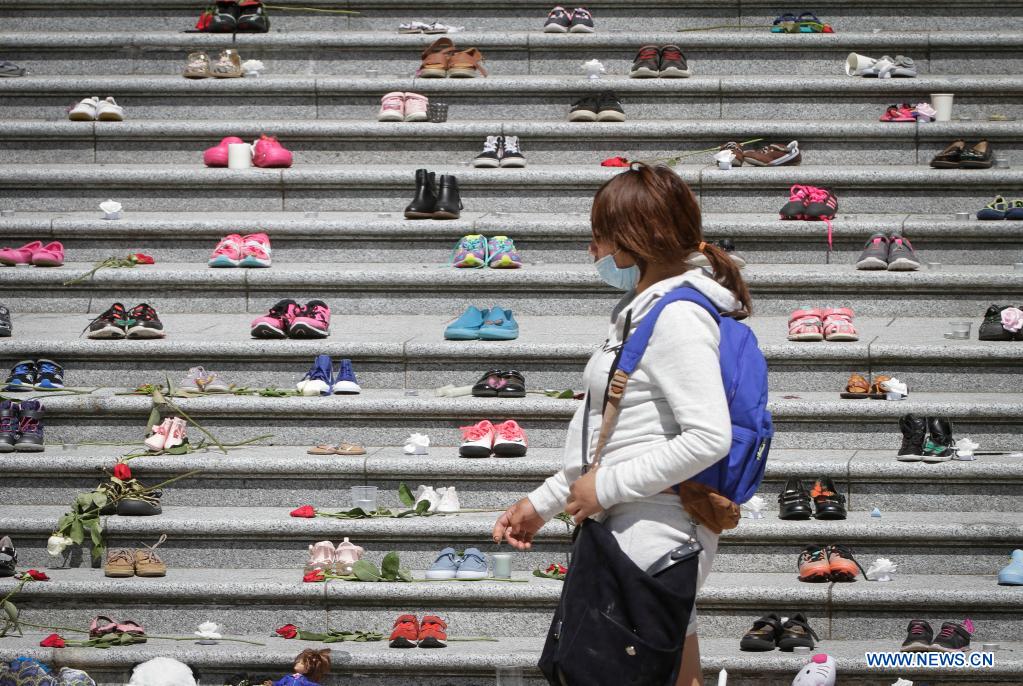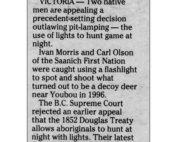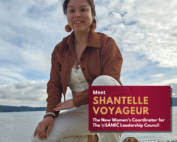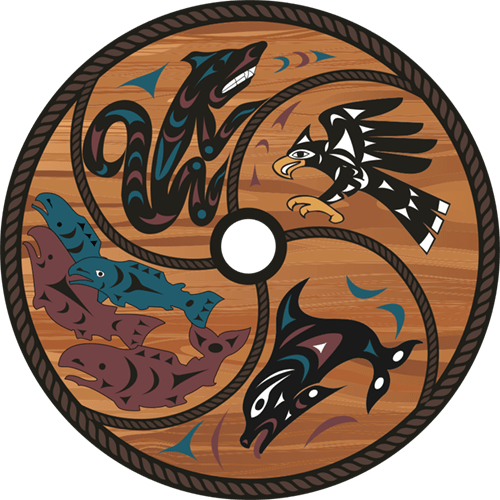The W̱SÁNEĆ Leadership Council (WLC) grieves with the Tk’emlups te Secwépemc, and with all of the families of the children lost to the Kamloops Indian Residential School.
Children’s shoes are placed on the staircase outside Vancouver Art Gallery to remember the 215 Tk’emlups te Secwépemc children lost to the residential school system. (Photo by Liang Sen/Xinhua)
Gord Elliott, Director of Operations stated: “There are no words to express the deep loss that we feel as W̱SÁNEĆ people, and as survivors when we hear an announcement like this. While we knew many children in our communities that did not return home, this confirmation brings deep heaviness to our hearts and spirits. Today we pray with the Tk’emlups te Secwépemc for healing and peace in the wake of this unthinkable news”
On May 27th, Tk’emlúps announced that the remains of 215 children – who were forcibly removed from their homes by the Canadian government to attend the school – were found buried on the grounds of the former residential school. This event is a brutal reminder of Canada’s ongoing legacy of the state-sanctioned genocide of Indigenous people. To date, more than 4,100 children who died while attending a residential school have been identified.
The Kamloops Industrial School (later known as the Kamloops Indian Residential School) was opened, under Roman Catholic administration, in 1890. It became the largest school in the Indian Affairs residential school system. Enrolment peaked in the early 1950s at 500.
“It is unknown how many children died and disappeared while attending residential schools in Canada with few known locations of their resting sites,” the British Columbia Assembly of First Nations assembly said. “Families who never saw their children return home experience never-ending grief and continue to live with deep scars,”
“We call upon Canada, and all of those who call yourselves Canadians, to witness and recognize the truth of our collective history. This is the reality of the genocide that was, and is, inflicted upon us as Indigenous peoples by the colonial state. Today we honour the lives of those children, and hold prayers that they, and their families, may finally be at peace,” stated Grand Chief Stewart Phillip, Union of BC Indian Chiefs President.
“We express our deepest sympathy to the Tk’emlúps te Secwépemc and our gratitude for shouldering the immense responsibility of caretaking for these lost children,” stated Chief Don Tom, UBCIC Vice-President. “In 1969, over 150 Chiefs and delegates gathered on the grounds of the Kamloops Indian Residential School for the first ever assembly of the Union of BC Indian Chiefs. Those leaders gathered together on these grounds, and what we now know to be the sacred, and final, resting place of these children. They came together to challenge the interference of the colonial state on our lives, on our children’s lives, and to fight for our future generations. This can only be felt deeply as we stand united today, as our leaders stood united over 50 years ago, in our collective grief, healing, and strength.”
Click here to read the news release from Tk’emlups te Secwépemc
Please reach out for support to:
KUU-US Crisis Line Society
The KUU-US Crisis Line Society operates 24 hours and is a provincial aboriginal crisis line.
Phone: Adult Crisis Line 250-723-4050
Youth Crisis Line: 250-723-2040
Crisis Intervention and Suicide Prevention Centre
Confidential, non-judgmental, free emotional support 24 hours a day, 7 days a week for people experiencing feelings of distress or despair, including feelings which may lead to suicide.
Phone: 604.872.3311
Deaf or hearing-impaired: 1.866.872.0113
Indian Residential School Survivors Society (IRSSS)
The Indian Residential School Survivors Society encourages you to take time to care for your Mental and Emotional wellbeing. Please contact the Indian Residential School Survivors Society 24hr Crises Line if you require further emotional support or assistance.
Phone: 1.866.925.4419
Kids Help Phone
Immediate and caring support, information and, if necessary, referral to a local community or social service agency. The 24-hour distress line is staffed by counsellors and trained volunteers who are committed to helping youths in crisis.
Phone: 1.800.668.6868
First Nations Health Authority, Website
Canadian Mental Health Association, Website







